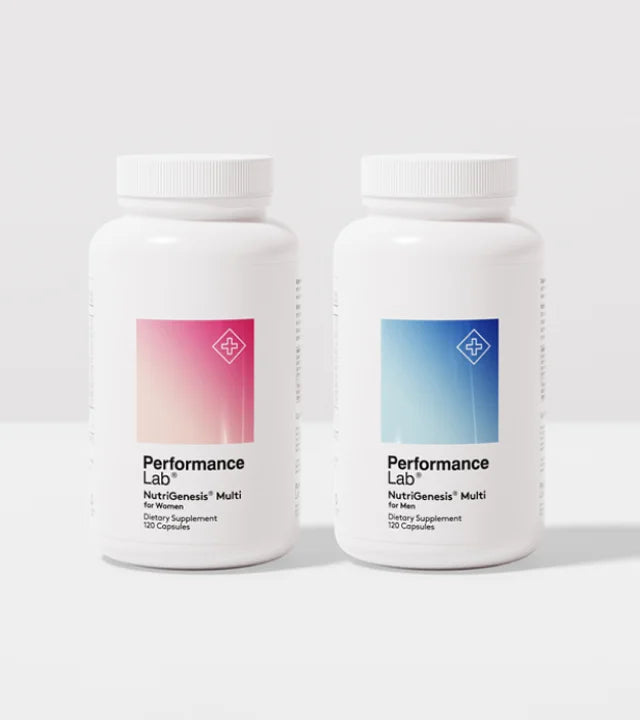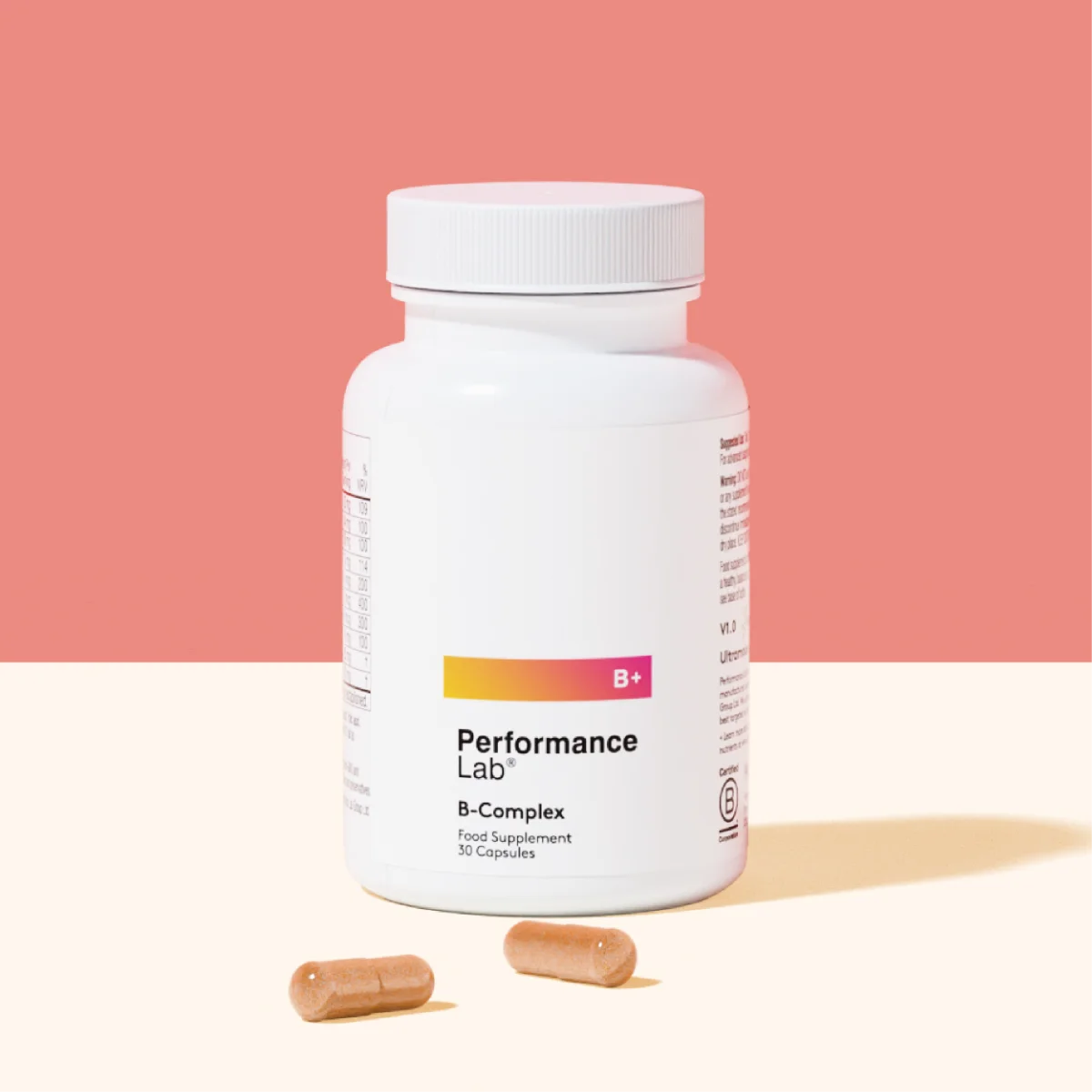Vitamin B12 is an essential, water-soluble vitamin within the diverse B-vitamin family.
Each B vitamin has a unique role and benefit. But B12 stands out as a key player in the health and wellness space, supporting many critical functions, especially for seniors.
For many people, aging means that looking after your body requires special care—our needs change from when we were younger.
A big part of that care means eating well and exercising regularly. But it also means providing your body with essential nutrients that may be lacking from the diet in sufficient amounts. Unfortunately, as we age, we're at a higher risk of experiencing a vitamin deficiency.
Because aging increases the risk of certain conditions, meeting your intake requirements for essential vitamins and minerals is vital.
Maintaining healthy vitamin B12 levels plays a big part in keeping you healthy and active well into retirement years and beyond.
In this article, we'll explore the benefits of vitamin B12, why age is linked to absorption, the signs and symptoms of a B12 deficiency, and find out how much vitamin B12 you need.
Key Takeaways
- Dosage guidance: 500–1,000 mcg/day. NIH recommends adults over 50 to get vitamin B12 from supplements or fortified foods. Research has found that 500 mcg may support normal levels in most, but some may need 1,000+ mcg per day. [13]
- B12 is essential. It powers energy (ATP), supports brain + central nervous system, red blood cells, bones, and heart. [12]
- Deficiency risk rises with age. Up to 20% of adults over 60 are deficient or low in B12. [8] A common culprit is weak stomach acid leading to poor nutrient absorption. [17]
- Testing matters. Blood tests and MMA levels can flag deficiency. But impaired kidney function can elevate MMA/Hcy, mimicking B12 deficiency. Always check kidney health alongside biomarkers. [18]
- Diet first. But for seniors, fortified foods and supplements can make a difference. A good multivitamin with B12 + full B-complex can support the efforts to improve nutrient absorption, energy, and long-term vitality.
B12 Basics: An Essential Vitamin for Older Adults
Vitamin B12 is one of the eight B vitamins essential for keeping us healthy, especially as we age.
Your body uses B12 to make red blood cells, which carry oxygen into tissues. [12]
In addition, it helps you metabolize fats and amino acids; crucial for keeping normal energy levels and well-being.
As stomach acid decreases with age, so does the body's ability to absorb vitamin B12 from foods. A deficiency in vitamin B12 can lead to serious health problems, including anemia, nerve damage, memory loss, and an increased risk of cardiovascular disease. [12, 17, 28]
You'll find it in high amounts in animal products like meat, fish, and dairy products, but you can also support your intake through dietary supplements.
Why do You Need Vitamin B12?
Vitamin B12 is crucial for many bodily processes beyond the ones mentioned earlier. From maintaining healthy nerve cells to the creation of DNA and supporting brain function.
Adequate B12, alongside folate, plays a role in reducing the risk of neural tube defects during pregnancy, and it's just as important later in life. [19]
Because of the source, B12 is a vitamin that not all of us will be able to consume in adequate amounts. Especially those following a vegetarian or vegan diet.
Most plant foods do not naturally contain vitamin B12. Some vegans get it through foods like fortified cereals and breakfast cereals, though it's important to avoid ones with too much sugar and additives, as this can bring its own health concerns.
This essential vitamin shouldn’t be underestimated. B12 plays a role in preventing anemia, supporting bone health, and aiding in mental well-being. [12, 16, 20] All of which are key, especially as we turn older.
Let's explore the effects of vitamin B12 on the human body in more detail.
Health Benefits Of Vitamin B12 For Seniors

As with the other B vitamins, vitamin B12, also called cobalamin, plays an integral role in several important physiological functions.
1. Energy
Vitamin B12 is essential for converting glucose from food into adenosine triphosphate (ATP) via the Krebs cycle, which serves as the building block for all other biological processes, as ATP is the most important energy molecule. [1]
2. Nerve Function, Mood, and Brain Health
At a neurological level, vitamin B12 maintains the health of nerve cells. It’s crucial for the formation of protective myelin sheaths around the nerves.
This function is not only important for transmitting signals efficiently across the nervous system, but also for ensuring overall brain health. Deficiencies in B12 can lead to noticeable neurological and cognitive impairments. [12, 21]
B12 also appears to affect mood. A systematic review in Nutr Rev. linked B vitamins, including vitamin B12, with depression risk. [16] This highlights its role in supporting cognitive well-being, particularly in older adults.
3. Red Blood Cells and Blood Health
Without sufficient B12, the body cannot form new red blood cells, affecting blood cell production. Erythroblasts, also known as immature red blood cells, require folate and vitamin B12 for proliferation during their differentiation phase. Folic acid is also crucial for red blood cell production, and a deficiency of either vitamin can inhibit the proper formation of RBCs, leading to anemia. [2]
Maintaining a healthy red blood cell count is essential for transporting oxygen to the body’s tissues, a critical function for overall health and vitality.
4. Bone health
Bone health becomes an area for concern with seniors, and while vitamin D, magnesium, and calcium are the go-to bone nutrients, vitamin B12 is also necessary.
Due to its involvement in homocysteine levels, studies suggest that vitamin B12 may protect bone health and reduce the risk of osteoporosis or hip fractures. [3]
The mechanisms behind B12 and bone physiology aren't completely clear. Still, research shows that B12 directly affects osteoblast proliferation and formation, and a B12 deficiency can increase osteoclast activity, potentially through its impact on increasing methylmalonic acid (MMA) and homocysteine levels. [4]
5. Heart health
Heart health is a concern for most people, but it becomes especially pertinent for seniors as the risk of cardiovascular events increases with age.
High blood levels of homocysteine, a toxic amino acid, have been implicated as a significant risk factor for the development of cardiovascular diseases, as it has adverse effects on vascular endothelium and smooth muscle cells, which can impair arterial structure and function. [5]
Because B12 is required for homocysteine metabolism, research shows that adequate intake of B12 can reduce homocysteine, thereby decreasing your risk of heart disease and stroke. [6]
We've looked at the areas where B12 is crucial for maintaining optimal health.
How do we know if we're not getting enough?
This next section gives us some indicators to look out for.
Understanding Vitamin B12 Deficiency

Did you know? In healthy people, vitamin B12 gets stored in the liver, with reserves estimated to last about 3 years. [22] This is both good and bad news.
The good news is, you don't need to consume B12 every day to maintain adequate levels. The bad news is, vitamin B12 deficiency can develop gradually with no obvious symptoms for years. Blood tests can show low levels before that happens. [23]
Identifying Vitamin B12 Deficiency
As a result, a vitamin B12 deficiency can sometimes be difficult to spot. Symptoms vary widely and can develop gradually over a period of time.
Early signs to look out for are fatigue, muscle weakness, a general sense of lethargy, and in some cases a tingling sensation in the hands or feet. These could all be indicative of a deficiency.
At-Risk Groups
Alongside older adults, people at a higher risk of B12 deficiency include those on stomach acid-lowering medications, people with certain diseases, and those with pernicious anemia. [8, 12, 22]
While vitamin B12 deficiency is more likely to occur in an older person, it's also estimated to happen in about 6% of the general population under 60 in the U.S and U.K.
Those following vegetarian or vegan diets may also find it challenging to get enough B12 as this vitamin is predominantly found in animal products. Vegetarians and vegans may need to incorporate fortified foods or supplements into their diets to ensure their needs are being met. [8, 12, 22]
Being aware of these risk factors is key to preventing B12 deficiency.
Consequences of a B12 Deficiency
If our body doesn’t have enough B12, then it can’t make enough healthy red blood cells.
Pernicious anemia is a specific form of vitamin B12 deficiency caused by the loss of the body’s ability to make intrinsic factor, which is necessary for B12 absorption. And this can lead to vitamin B12 deficiency anemia. [23]
A serious lack of vitamin B12 can lead to megaloblastic anemia. This is a blood condition where your body produces larger than normal and not fully developed red blood cells. These oversized cells can’t carry oxygen as well as they should, meaning you feel tired and weak. [22]
Blood tests are the most straightforward way to determine if your vitamin B12 levels are within the normal range.
Diagnosing a Deficiency

How do you know if you have a deficiency?
If you’re feeling any of the early signs such as fatigue and weakness, it may be worth talking to a medical professional. Getting a diagnosis will typically involve a simple blood test. Doctors often test for folate deficiency alongside vitamin B12 to diagnose the type of anemia. A methylmalonic acid (MMA) test can help detect even a mild deficiency. MMA tests can be carried out using a blood or urine sample.
Here's the important part, though: you need to consider your kidney health when checking for B12 deficiency. Weakened kidney function can elevate MMA and Hcy levels. Mimicking B12 deficiency. But it's not. [18]
Your healthcare provider may send you for a blood test and check kidney function. This is a crucial step in diagnosing deficiency.
Spotting the first warning signs of a deficiency is key. But understanding why your body might be struggling to absorb enough B12 is crucial.
Factors Affecting Vitamin B12 Absorption
Age and The Role of Stomach Acid
The absorption of vitamin B12 is a complex process that heavily relies on stomach acid and a protein called intrinsic factor. Stomach acid helps to separate B12 from the protein it’s attached to in food, allowing it to bind with the intrinsic factor.
Age-related changes in the gastrointestinal tract leading to less stomach acid can further reduce the efficiency of vitamin B12 absorption. So B12 can’t be effectively used.
Dietary Choices
Dietary choices play a significant role in B12 levels, especially for those following a vegetarian or vegan diet. Since B12 is primarily found in animal products, if we don’t get enough of these foods, we may struggle to take in enough vitamin B12.
Medical Conditions
Certain medical conditions, especially digestive disorders like atrophic gastritis (stomach lining inflammation and thinning), Crohn’s disease, and celiac disease, can severely impact B12 absorption. [14, 22]
Crohn's disease can damage the small intestine, which is where vitamin B12 is absorbed, leading to deficiency.
Proton pump inhibitors can make it difficult for the body to metabolize vitamin B12, increasing the risk of deficiency. [24]
These conditions can damage parts of the gut where B12 absorption occurs, leading to a deficiency regardless of dietary intake.
Managing and Treating Vitamin B12 Deficiency

While vitamin B12 supplementation can help in cases of deficiency, its role in supporting health outcomes for seniors varies depending on the specific condition being addressed.
Dietary Supplements and Diet
Diet is always the first step. But if you follow a vegan or vegetarian diet, dietary supplements can help. The National Institutes of Health recommends B12-fortified foods or taking supplements for older adults. A good multivitamin will contain vitamin B12 along with the rest of the B complex family and other essential vitamins.
Lifestyle Adjustments
Making some simple lifestyle adjustments can really help to enhance B12 absorption. Along with dietary changes and including more B12-rich foods, avoiding excessive alcohol and smoking also backs overall nutrient absorption. [25, 26]
In more severe cases, doctors may recommend injections as part of treatment to quickly restore B12 levels. [27]
How Much Vitamin B12 Should Seniors Take?

Seniors are more likely to have a vitamin B12 deficiency, and it’s suggested that up to 20% of adults over 60 are deficient, or at least low, in vitamin B12. [7, 8]
Because there’s a higher risk of malabsorption of B12 in older adults, the National Academy of Medicine recommends that adults over 50 consume most of their B12 through supplements or fortified foods, where the nutrient is easier to access and absorb. [9]
The recommended dietary allowance (RDA) for vitamin B12 intake for adults is 2.4mcg, but this may be too low for seniors with elevated needs. [12]
A 2013 study published in The Journal of Nutrition looked at the efficacy of B12 supplementation on levels in 100 older adults and found that 500 mcg for 8 weeks normalized vitamin B12 levels in 90% of participants. [10]
However, some people may need higher doses of 1,000 mcg to normalize levels.
It’s also important to note that research has examined potential risks of high levels of B12, including associations with certain health conditions. [15] This is why it's crucial for seniors to consult a health professional to pinpoint the right vitamin B12 dosage for their unique needs.
So, what's the adequate vitamin B12 dosage for seniors?
Recent studies suggest that, along with a diet high in B12-rich foods, 500 micrograms of B12 via supplementation can help seniors maintain healthy vitamin B12 levels. [11]
For people struggling with a deficiency, a B12 supplement can support the relief of the signs and symptoms, some of which include:
- Pale skin
- Headaches
- Migraines
- Mood changes
Although a vitamin B12 deficiency is more common in older adults, it's also often caused by insufficient dietary intake.
That's why having a good multivitamin in your supplement stack—regardless of age—is a great way to maintain vitamin and mineral levels and avoid a deficiency.
Whether you're 25 or 65, Performance Lab® NutriGenesis® Multi is specifically formulated to fill in nutrient gaps in your diet with the most advanced and bioavailable nutrient forms.
All NutriGenesis vitamins and minerals are food-identical, complexed with natural cofactors that enhance absorption and bioactivities to maximize B12 bioavailability regardless of age.
Performance Lab® NutriGenesis Multi
The world's most advanced multivitamin formula.
Shop Now
You May Also Like: Best Multivitamin for Women Over 70
References
- Fehling, C., Nilsson, B., & Jägerstad, M. (1979). Effect of vitamin B12 deficiency on energy-rich phosphates, glycolytic and citric acid cycle metabolites and associated amino acids in rat cerebral cortex. Journal of neurochemistry, 32(3), 1115–1117. https://doi.org/10.1111/j.1471-4159.1979.tb04603.x
- Koury, M. J., & Ponka, P. (2004). New insights into erythropoiesis: the roles of folate, vitamin B12, and iron. Annual review of nutrition, 24, 105–131. https://doi.org/10.1146/annurev.nutr.24.012003.132306
- Dai, Z., & Koh, W. P. (2015). B-vitamins and bone health--a review of the current evidence. Nutrients, 7(5), 3322–3346. https://doi.org/10.3390/nu7053322
- Vaes, B. L., Lute, C., Blom, H. J., Bravenboer, N., de Vries, T. J., Everts, V., Dhonukshe-Rutten, R. A., Müller, M., de Groot, L. C., & Steegenga, W. T. (2009). Vitamin B(12) deficiency stimulates osteoclastogenesis via increased homocysteine and methylmalonic acid. Calcified tissue international, 84(5), 413–422. https://pubmed.ncbi.nlm.nih.gov/19363664/
- Ganguly, P., & Alam, S. F. (2015). Role of homocysteine in the development of cardiovascular disease. Nutrition journal, 14, 6. https://pubmed.ncbi.nlm.nih.gov/25577237/
- Markišić, M., Pavlović, A. M., & Pavlović, D. M. (2017). The Impact of Homocysteine, Vitamin B12, and Vitamin D Levels on Functional Outcome after First-Ever Ischaemic Stroke. BioMed research international, 2017, 5489057. https://doi.org/10.1155/2017/5489057
- Stover P. J. (2010). Vitamin B12 and older adults. Current opinion in clinical nutrition and metabolic care, 13(1), 24–27. https://doi.org/10.1097/MCO.0b013e328333d157
- Allen L. H. (2009). How common is vitamin B-12 deficiency?. The American journal of clinical nutrition, 89(2), 693S–6S. https://doi.org/10.3945/ajcn.2008.26947A
- Institute of Medicine (US) Standing Committee on the Scientific Evaluation of Dietary Reference Intakes and its Panel on Folate, Other B Vitamins, and Choline. (1998). Dietary reference intakes for thiamin, riboflavin, niacin, vitamin B6, folate, vitamin B12, pantothenic acid, biotin, and choline. National Academies Press. https://www.ncbi.nlm.nih.gov/books/NBK114310/
- Hill, M. H., Flatley, J. E., Barker, M. E., Garner, C. M., Manning, N. J., Olpin, S. E., Moat, S. J., Russell, J., & Powers, H. J. (2013). A vitamin B-12 supplement of 500 μg/d for eight weeks does not normalize urinary methylmalonic acid or other biomarkers of vitamin B-12 status in elderly people with moderately poor vitamin B-12 status. The Journal of nutrition, 143(2), 142–147. https://doi.org/10.3945/jn.112.169193
- Park, S., & Johnson, M. A. (2006). What is an adequate dose of oral vitamin B12 in older people with poor vitamin B12 status?. Nutrition reviews, 64(8), 373–378. https://doi.org/10.1111/j.1753-4887.2006.tb00222.x
- Office of Dietary Supplements. (n.d.). Vitamin B12—Health Professional Fact Sheet. U.S. Department of Health and Human Services. Retrieved September 9, 2025, from Office of Dietary Supplements website: https://ods.od.nih.gov/factsheets/VitaminB12-HealthProfessional/
- Office of Dietary Supplements. (2023, December 15). Vitamin B12—Consumer fact sheet. U.S. Department of Health and Human Services. Retrieved September 9, 2025, from Office of Dietary Supplements website: https://ods.od.nih.gov/factsheets/VitaminB12-Consumer/
- Henoun Loukili, N., Noel, E., Ben Abdelghani, M., Locatelli, F., Blickle, J. F., & Andres, E. (2005). Cobalamin deficiency due to non-immune atrophic gastritis in elderly patients. A report of 25 cases. The journal of nutrition, health & aging, 9(6), 462.
- Arendt, J. F. H., Sørensen, H. T., Horsfall, L. J., & Petersen, I. (2019). Elevated Vitamin B12 Levels and Cancer Risk in UK Primary Care: A THIN Database Cohort Study. Cancer epidemiology, biomarkers & prevention : a publication of the American Association for Cancer Research, cosponsored by the American Society of Preventive Oncology, 28(4), 814–821. https://doi.org/10.1158/1055-9965.EPI-17-1136
- Wu, Y., Zhang, L., Li, S., & Zhang, D. (2022). Associations of dietary vitamin B1, vitamin B2, vitamin B6, and vitamin B12 with the risk of depression: a systematic review and meta-analysis. Nutr Rev., 80(3), 351–366. https://doi.org/10.1093/nutrit/nuab014
- Lane, A., Lau, L., Alhannat, C., Arya, M., Bokor, M., Cheney, C., Keesara, M., McDaniels, M., Mookerjee, N., Mowdawalla, C., Napoli, L., Porter, A., Rao, S., Sheikh, F., Shin, J., Sibblis, J., Weidemann, H., Yerram, R., Hunter, K., & Roy, S. (2025). Risk Factors and Comorbidities Associated With Vitamin B12 Deficiency in an Adult Population. Journal of primary care & community health, 16, 21501319251360498. https://doi.org/10.1177/21501319251360498
- Riphagen, I. J., Minović, I., Groothof, D., Post, A., Eggersdorfer, M. L., Kootstra-Ros, J. E., de Borst, M. H., Navis, G., Muskiet, F. A. J., Kema, I. P., Heiner-Fokkema, M. R., & Bakker, S. J. L. (2020). Methylmalonic acid, vitamin B12, renal function, and risk of all-cause mortality in the general population: results from the prospective Lifelines-MINUTHE study. BMC medicine, 18(1), 380. https://doi.org/10.1186/s12916-020-01853-x
- Nie, L., Liu, X., Li, X., Ren, Z., Cheng, X., Wu, Y., Li, Z., & Liu, J. (2025). Beyond Folate: The Emerging Role of Maternal Vitamin B12 in Neural Tube Development. Nutrients, 17(12), 2040. https://doi.org/10.3390/nu17122040
- Fishman, S. M., Christian, P., & West, K. P. (2000). The role of vitamins in the prevention and control of anaemia. Public health nutrition, 3(2), 125–150. https://doi.org/10.1017/s1368980000000173
- Moore, E., Mander, A., Ames, D., Carne, R., Sanders, K., & Watters, D. (2012). Cognitive impairment and vitamin B12: a review. International psychogeriatrics, 24(4), 541–556. https://doi.org/10.1017/S1041610211002511
- Ankar, A., & Kumar, A. (2024). Vitamin B12 deficiency. In StatPearls [Internet]. StatPearls Publishing. https://www.ncbi.nlm.nih.gov/books/NBK441923/
- Vaqar, S., & Shackelford, K. B. (2023). Pernicious anemia. In StatPearls [Internet]. StatPearls Publishing. https://www.ncbi.nlm.nih.gov/books/NBK540989/
- Heidelbaugh J. J. (2013). Proton pump inhibitors and risk of vitamin and mineral deficiency: evidence and clinical implications. Therapeutic advances in drug safety, 4(3), 125–133. https://doi.org/10.1177/2042098613482484
- Azzini, E., Raguzzini, A., & Polito, A. (2021). A Brief Review on Vitamin B12 Deficiency Looking at Some Case Study Reports in Adults. International journal of molecular sciences, 22(18), 9694. https://doi.org/10.3390/ijms22189694
- Al Zoubi, M. S., Al-Oun, M. A., Abusahyoun, F. Y., Abualarja, M. I., Al Smadi, A., Al-Trad, B., Awadin, S. A., Al-Batayneh, K., Elaarag, M., & Al-Zoubi, R. M. (2024). Exploring the Impact of Cigarette Smoke Extracts on Vitamin B12: Insights into the Transformation of Methylcobalamin and Hydroxycobalamin to Cyanocobalamin through In Vitro Evaluation. Biochemistry research international, 2024, 8827402. https://doi.org/10.1155/2024/8827402
- Wolffenbuttel, B. H., Owen, P. J., Ward, M., & Green, R. (2023). Vitamin B12. BMJ (Clinical research ed.), 383, e071725. https://doi.org/10.1136/bmj-2022-071725
- Pawlak R. (2015). Is vitamin B12 deficiency a risk factor for cardiovascular disease in vegetarians?. American journal of preventive medicine, 48(6), e11–e26. https://doi.org/10.1016/j.amepre.2015.02.009

















